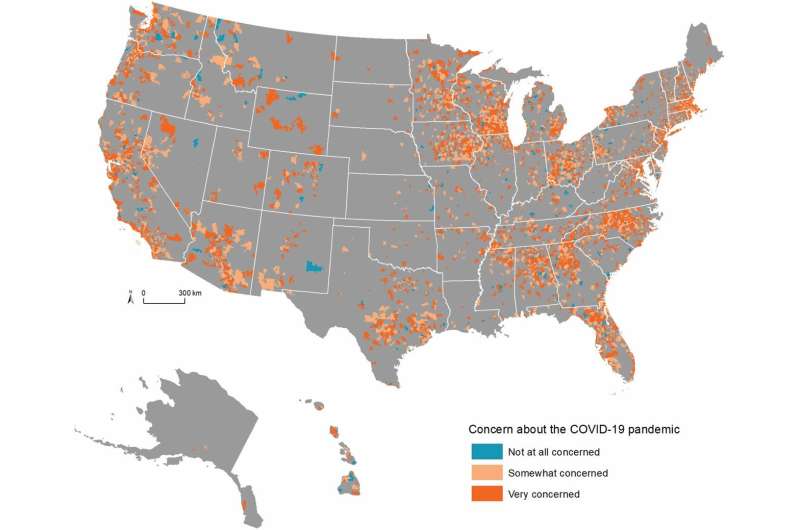Pandemic's many effects on older women documented

A new supplemental issue to The Journals of Gerontology, Series A: Biological Sciences and Medical Sciences, titled "The Impact, Experience, and Challenges of COVID-19: The Women's Health Initiative (WHI)," explores key areas on how older women initially responded to the threat of COVID-19, their concerns about the pandemic, and aspects of their prior health and well-being that may have influenced the impact of COVID-19 on their lives.
The WHI represents one of the largest and most diverse longitudinal studies conducted in postmenopausal women. Three decades after its 1992 launch, 52,543 women continue to be actively engaged in the core of this landmark study, with a mean age of 86.6 (ranging from 73 to 106 years of age).
The supplement's articles are based on survey research conducted among 49,695 WHI participants between June and October 2020. In addition to the data derived from the survey, authors were able to draw from detailed historical data available on the participants prior to the pandemic, as well as annual data collected concurrently with the COVID-19 survey. A follow-up survey was conducted from June to December 2021.
"The long history of participation preceding COVID-19 and continued participation in study activities during COVID-19 allowed for a deep characterization of the impact and experience among older women, while accounting for past and current individual health behaviors and outcomes," wrote guest editors Sally A. Shumaker, Ph.D., Andrea Z. LaCroix, Ph.D., and Jennifer W. Bea, Ph.D.
The researchers' findings showed that the COVID-19 pandemic was associated with impacts on health and well-being, living situations, lifestyle, health care access, and SARS-CoV-2 testing and preventive behaviors.
WHI participants were more likely to report very good or good levels of well-being, but in lower frequency in the fall of 2020 compared to the summer. Respondents reported being very concerned about the pandemic (more commonly reported among urban residents), with many participating in preventive behaviors including wearing a face mask (which were more commonly practiced in the summer compared to the fall).
The most common disruption in living arrangements included having family or friends move in, although a higher proportion of respondents in the fall compared to the summer reported moving into a care facility and/or having their care provider come to help. Many women reported changes in medication and health care access, which included delays in getting prescriptions filled and health care appointment conversions to telephone or online (the latter more commonly reported among urban residents).
There were notable changes in lifestyle factors; for example, over half of women reported less physical activity or exercise compared to before the pandemic, which was more commonly reported among women residing in urban areas. A lower proportion of women reported consuming alcohol compared to reports from prior to the COVID-19 pandemic.
"While the women in the WHI demonstrated remarkable resiliency overall, these findings help guide our response to those multifaceted social, psychological, and physical struggles and comorbidities that are not only associated with COVID-19 infection in an older population, but also with the societal and infrastructure barriers in the context of the COVID-19 era," Shumaker, LaCroix, and Bea wrote.
"As COVID-19 and our societal response to it evolves, it is important to continue to study the impact on high-risk groups, such as the older women in the WHI."
More information: Sally A Shumaker et al, The Impact, Experience, and Challenges of COVID-19 on the Women's Health Initiative Participants: An Introduction to the Special Issue, The Journals of Gerontology: Series A (2022). DOI: 10.1093/gerona/glac207
Trang VoPham et al, The Impact of the COVID-19 Pandemic on Older Women in the Women's Health Initiative, The Journals of Gerontology: Series A (2022). DOI: 10.1093/gerona/glac056
Eugenia Wong et al, Continuity of Care Among Postmenopausal Women With Cardiometabolic Diseases in the United States Early During the COVID-19 Pandemic: Findings From the Women's Health Initiative, The Journals of Gerontology: Series A (2022). DOI: 10.1093/gerona/glac170
Carolyn J Crandall et al, Relationship of Social Connectedness With Decreasing Physical Activity During the COVID-19 Pandemic Among Older Women Participating in the Women's Health Initiative Study, The Journals of Gerontology: Series A (2022). DOI: 10.1093/gerona/glac108
Aladdin H Shadyab et al, Association of Global Cognitive Function With Psychological Distress and Adherence to Public Health Recommendations During the Coronavirus Disease 2019 Pandemic: The Women's Health Initiative, The Journals of Gerontology: Series A (2022). DOI: 10.1093/gerona/glac053
Jennifer W Bea et al, What We've Learned From the Women's Health Initiative Participants About Their COVID-19 Experience, The Journals of Gerontology: Series A (2022). DOI: 10.1093/gerona/glac196



















